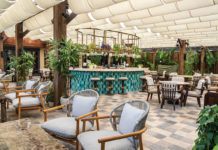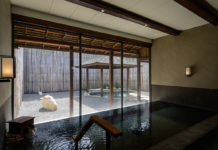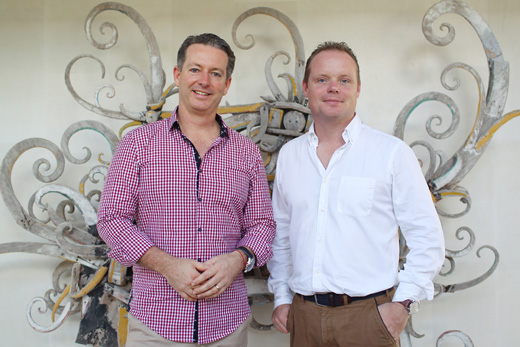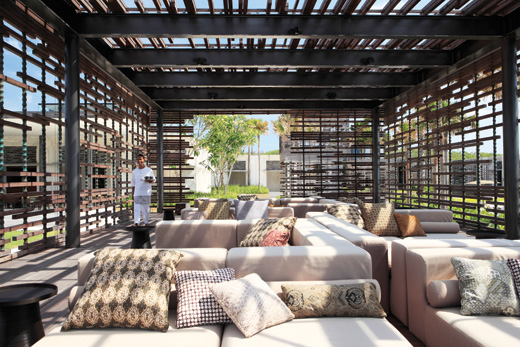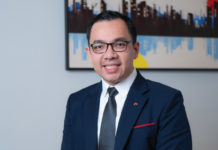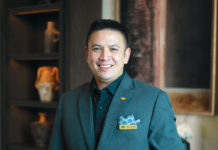RESORTINGTO GREATNESS
Sean Brennan, the former General Manager of Alila Villas Uluwatu, was recently named the Regional Vice President for South East Asia, and Marco Groten, the former GM of Alila Villas Soori is now taking the reins as GM at Alila Villas Uluwatu. Both of them have long and distinguished careers in the hospitality industry and both are known for being extremely pro-active, hands on General Managers. They spoke with Asia Dreams, just two weeks into their new roles, about the challenges they have faced, what Alila Hotels & Resorts has brought to Bali and what the future holds.
ASIA DREAMS: First of all, congratulations to both of you on your new positions! Marco, how are you settling in to your new job as GM of Alila Villas Uluwatu?
Marco: Well it’s quite different from Alila Villas Soori, but the two resorts complement each other well. Day-to-day, it’s not that much of a change from what I was doing before, but the needs of the guests are a bit different. At Alila Villas Soori, a lot of the guests who stay at the property go out in the morning, venture around for the day, and then come back again in the evening. Whereas here at Alila Villas Uluwatu, guests are more likely to stay in during the day and venture out at night, going to different restaurants and bars because those are a bit more accessible. And of course I’m getting to know all of the team members. I already knew many of them by name before but now I’m getting to know them in-depth and how they manage their departments.
ASIA DREAMS: And how is your new role as Regional Vice President for South East Asia treating you so far, Sean?
Sean: It’s strange not waking up to a resort full of guests to greet. I’m now in a position where I don’t have that direct guest contact, which, I have to say, I already miss even just in these first few weeks. It’s also challenging because I’ve got to learn how to deal with a lot of new responsibilities, like handling our new developments. I think the great thing for me is that, because I’ve been managing hotels for so long, I understand the challenges that Marco and the other GM’s face and I want to be able to bridge that divide, to not be ‘us’ and ‘them’ but to just be us, all working together as a whole. It’s a hard trick to pull off but one I’m determined to get right.
ASIA DREAMS: You’ve both had long and distinguished careers in the hospitality industry. What are some of the most challenging situations you’ve faced in your careers?
Marco: Managing a resort in the Maldives during the 2004 Asian Tsunami was definitely one of my biggest challenges. We were fully booked on that day, December 24, 2004. At first we didn’t even realise what was happening. The only thing we were clear on was that we had to evacuate the guests immediately. We lost electricity, which meant that we didn’t have water and we lost a couple of villas. We were one of the first hotels to start evacuating and we sent everyone to Malé, where we hired any accommodations we could find. We bought mattresses to put in empty houses just to house all of our guests because, at that time, Malé didn’t have a lot of hotels. We were very lucky in that, by three or four o’clock in the afternoon, we had everybody out of the hotel. We did have some weird reactions from guests. People said things like, ‘Oh, I think I’ll just stay on,” or asking ‘Where is my laundry?’ because all of their clothes had been washed away.
Finally, at about five o’clock, everybody had gone except for the 280 staff members and there was an overwhelming feeling of ‘What are we going to do now?’ But the decision to rebuild the resort came soon after. It was a very difficult time, as some of the staff members had lost their family members. Trying to keep people motivated for the reopening of the resort was very tough. One of the good things that came out of it was that we had guests that donated so much, more than $120,000, to help out these families. In the end, almost all of the staff stayed on to help with the rebuilding. Which was crucial, because we had to do things like hand carry sand back onto the beach because everything had been washed away. But once we reopened, it was such a big achievement and an absolutely great feeling.
But every job has its own challenges. When we opened Alila Villas Soori, that was also a major achievement. The first time I went there, there were no paved roads going to the village, no cell phone coverage, no proper electricity. To make all of that happen and get it open was really rewarding. At the height of the construction process, we had 1,500 people working and living on site to get the resort up and running. I think every resort has its own story like that. I think that for hoteliers, if you want to be good at your job, it can’t just be a job. It has to be a lifestyle. You’ve got to live it. There is no other way to really do it right. If you think that you can do it from 9-5, forget it.
Sean: In any industry you get hit with a lot of challenges. I thrive on it and I know Marco does as well. We enjoy that challenge because, even if it’s a terrible or difficult situation, there’s a thrill in finding the best solution, with the resources you have, to make sure our guests are comfortable, safe and satisfied. But at the same time, you’re doing it in the background so it’s sort of seamless to the guests.
We could sit here and go through six bottles of wine just listing all of the challenges we’ve been through. Marco had the tsunami. I was in London for the IRA bombings — I was in one of London’s best hotels, Claridge’s, at the time. On that day, early in the morning, we had to wake up every one of our guests, guests who are paying 1000 GBP a night for a room there, and tell them to leave their rooms immediately, get them downstairs and evacuate them to the next hotel in the freezing cold. It was a very challenging situation, but those are the sort of things you have to be ready to deal with in our line of work.
ASIA DREAMS: What would you say sets Alila Hotels & Resorts apart from its competitors, from a management perspective?
Sean: Within Alila Hotels & Resorts, we pride ourselves on being visible. It’s very important as general managers and even corporate members that we are very accessible. As a guest. you’ve got to ask yourself, how many times do you meet a GM when you go to a hotel? In our hotels, the standard is you interact with the GM, on average, at least once a day. I think that’s something we’re really proud of. If a guest cries out for help, we’re the first responders. You’re not going to deal with some secretary or some call centre in India. We treat our GM’s as if they are the owners of their own businesses, so having that sense of ownership really makes them go the extra mile.
Marco: With these kinds of properties, every guest needs to be treated as a VIP. It’s not like at most four or five star hotels, where the only time you see a GM is if some dignitary or CEO is coming. Every single one of our guest spends an awful lot of money to stay with us, so when they’re here we better be too. And it’s not just us, it’s a commitment throughout the entire team to have sincere, personalised interactions with our guests,
ASIA DREAMS: How is it that every staff member at Alila Villas seems to know every guest’s name?
Sean: That’s a trade secret. If we told you we’d have to kill you (laughs).
Marco: Nowadays there are a lot of things you can do with technology in that regard.But ultimately it’s something the general managers are committed to, and thus everybody else learns to do it. So I think it’s leading by example.
Sean: And everybody gets a kick out of it. Because there’s nothing nicer than someone walking by a member of the staff and having them greet you by name and wishing you a good morning. I have to say that for Indonesians, in general, that kind of hospitality is in their DNA. Their genuine warmth makes it easy for them.
ASIA DREAMS: How have you seen the luxury market in Bali evolve over the last few years?
Marco: What we have seen is that there has been a huge upswing in the Asian market. For Alila Villas, this has been especially true with the North Asian markets of Korea, Japan, China and Taiwan. But perhaps most important has been the change with our Indonesian guests. When we first came here, many years ago, if you had asked Indonesians to stay at a five-star hotel in Bali, they would say, ‘No, I’d rather go to a luxury hotel in Singapore.’ That was very much the mindset at the time, but it has changed so much now.
Sean: They are our second largest supporters by nationality at our two villa properties. I think one thing we did right with both properties is that we maintained accessibility to Indonesians. We didn’t shut the door on them. We welcomed them because they are an integral part of our business. If you look at how many Indonesians travel to Bali every year, it completely outstrips the international travellers, so it’s something we’ve always maintained a very strong connection with.
ASIA DREAMS: What specific things is Alila Hotels & Resorts doing to give back to the community in Bali?
Marco: It’s very much driven by the team on the ground. Most of the resorts have their own programs that support their surrounding community. We have the ‘Gift to Share” program at most of the resorts now which lets guests stay with us for two nights, pay for one night and you then make a donation to a selected cause for the second night. It’s up to the guest how much they donate. So we try to highlight that but not be too in-your-face about it.
At Alila Villas Soori, since the beginning, we really wanted to help the local schools in the area since they were not nearly as well developed as you would hope for. Frankly, they were really in a desperate situation. So from the day we opened, the resort helped them out, especially the primary schools. When we saw that more and more donations were coming in, we decided to support one of the orphanages in Tabanan as well.
Sean: It does depend on what’s around you. At Alila Villas Uluwatu, there is an orphanage that we are supporting by providing for all of their food requirements per month. We encourage our guests to donate money and one hundred percent of the donations they put forward are given to the orphanage, so that’s been really successful. The orphanage is actually self-sustaining now in that they grow all their own vegetables and farm their own pigs and chickens. They have their own aquafarming setup so they’re not only breeding fish but then the fish waste is used as fertilizer. The orphanage is run by a foundation that has learned to be very resourceful, environmentally friendly and self-sustaining. They aren’t just constantly looking for handouts.
There is also a waste disposal project we’ve been supporting. In Bali, garbage has always been a big issue, so we started worked with a waste collection agent in Banjar Tambiyak, our local village, and encouraged him to start recycling. He was landfilling before we started working with him and now he’s 100% recycling, He takes all of the waste from the villas and the village and processes it, so there’s no burning garbage anywhere in this banjar. And financially, he’s earning a lot more money because of the recycling. We are very proud of that. We actually got him registered with EarthCheck, our environmental supporter, and he’s now getting government grants because he’s doing such a great job. He’s even educating other banjars on the bukit to do the same. So I think it’s important to support something that can sustain itself financially within the local community, because then everybody is benefiting from it.
ASIA DREAMS: What can you tell us about the upcoming Alila Seminyak?
Sean: It’s going to be very different from the villas but it’s going to have that ‘wow factor’ when you walk in the lobby and you see this amazing view of just the ocean. I think there are a few things that are going to make Alila Seminyak really special. First, the designs of the rooms are very unique and large – the average size of a room is 67 m², which is quite generous. Eighty percent of the rooms will have ocean views. But it’s also going to be a hotel that’s quite urban and chic. It’ll be very funky in terms of the food and beverage venues and in terms of the room design. You can see a few renderings on the website of how the rooms will look but it’ll definitely be something quite new and fresh for Seminyak,


